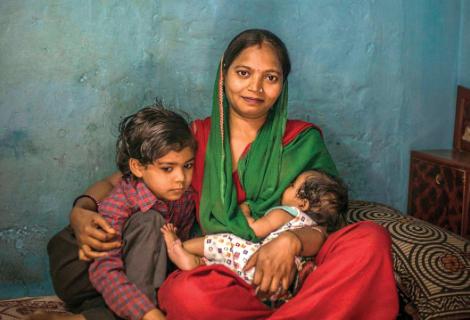
This year we kept the spotlight on women’s rights in all our work. This included supporting women and indigenous groups to strengthen their control over land and natural resources by lobbying for fairer and more sustainable policies governing these resources, and supporting them in adapting to effects of climate change. ActionAid Kenya, Mozambique, Sierra Leone and Nepal worked with partners to combat harmful traditional practices, such as female genital mutilation,and gender-based violence, while ActionAid The Gambia created a ‘One Stop Centre’ to provide services to victims of gender-based violence, enabling more people to report violations.
Advocacy and campaigning are powerful tools for creating awareness and empowerment. Innovative examples of this during 2014 were ActionAid Pakistan’s focus on ending girl-child marriage by establishing a helpline, and ActionAid Brazil’s focus on reducing the sexual exploitation of girls –including awareness-raising to deter sex tourism and exploitation – through its forceful Do not Play with My Right campaign during the 2014 FIFA World Cup. Our fight for public services hat prioritise the needs of women and girls resulted in more girls transitioning from primary to secondary school.
We also gained momentum in our international campaigning, linking local issues to our global agenda. For example, coordinated campaigning by ActionAid in communities across Africa as part of our Tax Power campaign influenced African governments to make a major regional commitment to change corporate tax laws. Our campaign work also significantly influenced the content of the African Union’s High Level Panel on Illicit Financial Flows report and recommendations (adopted by Heads of State in January 2015) which acknowledged corporate tax avoidance as the biggest flow out of Africa and the negative impact this has on development.
Meanwhile, our #Land-For campaign worked in 20 countries to safeguard the rights of women and marginalised communities to land, and to stop land grabs by foreign companies – it has already influenced the drafting of Kenya’s Community Land Bill. And our Safe Cities for Women campaign resulted in changes such as improved street lighting and clean water supplies to benefit women in cities in Democratic Republic of Congo.
Rooted in our human rights based approach we responded to 29 disasters in 19 countries, including the Syria refugee crisis, Typhoon Haiyan in the Philippines, the Gaza crisis and the Ebola outbreak in West Africa. For example, women’s leadership and strong community networks in communities were essential in the fight against Ebola. In Sierra Leone and Liberia, women from affected communities were involved in planning the response in their communities, and were trained as social mobilisers to raise awareness of Ebola prevention in their communities. We supported over one million people and secured just under €11.2 million for these responses.
ActionAid also maintained the urgency around climate change and co-convened the Climate 7 (C7) group of international non-governmental organisations, producing a strong critique on how ‘climate-smart agriculture’ may further exclude smallholder farmers in developing countries. We took part in negotiations on the Sustainable Development Goals at the UN General Assembly, producing a strong statement on how to ensure there is sufficient funding (through tax reform) to deliver on these ambitious goals.
In 2014 we appointed a new Chief Executive and rolled-out our renewed organisational vision to deepen the impact of our work, ensure the organisation’s financial sustainability and become more democratic, accountable and effective. We also restructured the International Secretariat (IS) and created new ways of working, including setting up ‘International Platforms’ which are spaces where countries can come together to share and integrate their plans, make decisions on policy research, advocacy and campaign initiatives, and share learnings and experience. This report shares more on our achievements, our challenges and our learning in 2014.